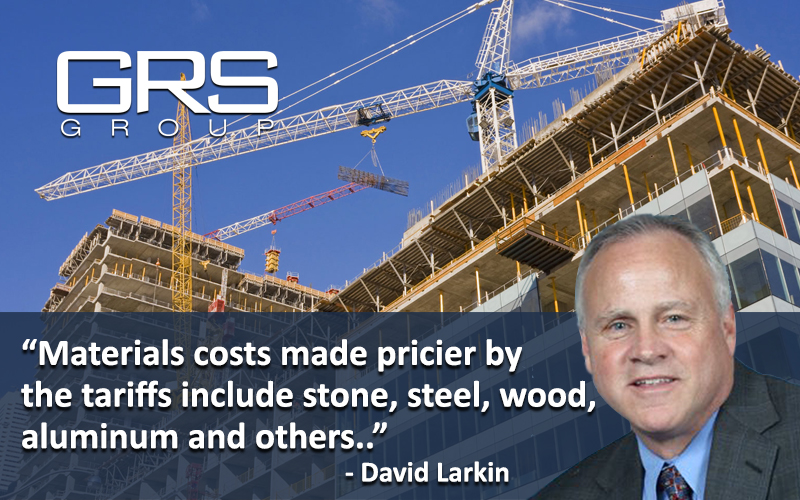David Larkin is a director at GRS Title. He can be reached at 973.362.4539 or via email at [email protected]
As we all try to predict and forecast the economic flow for 2019 and on—there are a multitude of factors at play. Cash fluidity, Interest rates, Inflation pressures, market demand, tariffs, material costs, and labor shortages are all in the mix.
Associated Builders and Contractors (ABC) predicts the construction sector will remain strong in 2019, yet there is a warning of possible inflationary pressure. While the U.S. economy is thriving, there is a potential long-term impact of rising interest rates and material prices — up 7.9 percent on a year-over-year basis in November — on the U.S. construction market.
The economy has been rolling solidly for the last few years, giving many in the construction and real estate world brilliant opportunities to utilize the cash fluidity that has arisen from all facets of industry. The only real problem for the cash flow is inventory availability and low ROI, right?
Well, no, we need to consider this roaring market and what can occur along the way. Nowhere is it more evident than the U.S. labor market. There were a record setting seven million job openings in the United States, and construction unemployment reached a low of 3.6 percent in November.
Now, there is a workforce shortage that will continue to influence the market in the coming year. A historically low unemployment rate has created a construction-workforce lag of an estimated 500,000 positions, which is leading to increased compensation costs.
What about those tariffs and the effect on the already high costs on materials? Are they going to kill the market?
“No,” said Grant Pruitt with Dallas commercial property firm Whitebox Real Estate. “But, you are going to see a prices increase. The challenge we are having is all the prices keep going up, up, up.”
A potential ballooning trade war between the United States and China and Canada is starting to hammer the nation’s construction industry. Materials costs made pricier by the tariffs include stone, steel, wood, aluminum and others.
While the U.S. economy is thriving, the ABC’s Chief Economist Anirban Basu cited the potential long-term impact of rising interest rates, material prices, and the workforce shortage will continue to influence the market in 2019. Basu stressed that a recession is unlikely in 2019, even with the recent financial market volatility and trade tariffs in place.
Indicators such as the Conference Board’s Leading Economic Index, which often signals an economic downturn, have continued to “tick” higher, implying current momentum will continue for at least two to three quarters. In addition, ABC’s Construction Backlog Indicator, which reflects the amount of work that will be performed by commercial and industrial contractors in the months ahead, reported a record backlog of 9.9 months in the third quarter of 2018.
But Basu warned that: “Contractors should be aware that recessions often follow within two years of peak confidence”
Given all the aspects of these coincidental market conditions, it looks like 2019 will be quite busy for contractors and the commercial markets, but beyond that, the outlook is a bit murky.
About GRS Group
GRS Group is a leading provider of commercial real estate (“CRE”) services worldwide. With offices across the United States, Europe, and affiliates around the globe, GRS Group provides local market knowledge with a global perspective for institutional real estate investors, occupiers and lenders worldwide. The GRS Group team has evaluated and advised on over $1 trillion in CRE transactions.
Through the company’s proprietary management process, Global Services Connection, GRS Group delivers an integrated suite of services including Financial Advisory, Transaction Management, Assessment and Title Insurance. We provide a single point of contact, capable of leveraging the GRS Group portfolio of companies and delivering customized solutions to assist our clients in achieving their investment goals.

